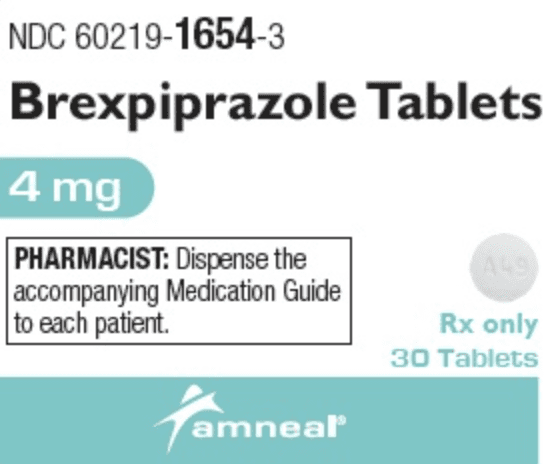Brexpiprazole and Alcohol/Food Interactions
There are 4 alcohol/food/lifestyle interactions with brexpiprazole.
Brexpiprazole Food/Lifestyle
Moderate Food Interaction
Alcohol can increase the nervous system side effects of brexpiprazole such as dizziness, drowsiness, and difficulty concentrating. Some people may also experience impairment in thinking and judgment. You should avoid or limit the use of alcohol while being treated with brexpiprazole. Do not use more than the recommended dose of brexpiprazole, and avoid activities requiring mental alertness such as driving or operating hazardous machinery until you know how the medication affects you. Talk to your doctor or pharmacist if you have any questions or concerns.
Switch to professional interaction data
Brexpiprazole Obesity
Moderate Potential Hazard, Moderate plausibility
atypical antipsychotic agents - hyperglycemia/diabetes
Hyperglycemia, in some cases extreme and associated with ketoacidosis or hyperosmolar coma or death, has been reported with the use of atypical antipsychotic agents. Patients with diabetes should be monitored for worsening control of blood glucose when treated with these agents. It is recommended that patients with risk factors for diabetes mellitus starting treatment with atypical antipsychotics should undergo fasting blood glucose testing at the beginning of treatment, and periodically thereafter. Any patient treated with atypical antipsychotics should be monitored for symptoms of hyperglycemia including polydipsia, polyuria, polyphagia, and weakness. Patients who develop symptoms of hyperglycemia during treatment with atypical antipsychotics should undergo fasting blood glucose testing. In some cases, hyperglycemia has resolved when treatment with these agents was discontinued; however, some patients required continuation of anti-diabetic treatment despite discontinuation of the atypical antipsychotic drug.
Brexpiprazole High Cholesterol (Hyperlipoproteinemia, Hypertriglyceridemia, Sitosterolemia)
Moderate Potential Hazard, Moderate plausibility
atypical antipsychotic agents - lipid alterations
Atypical antipsychotic drugs have been associated with undesirable alterations in lipid levels. While all agents in the class have been shown to produce some changes, each drug has its own specific risk profile. Before or soon after initiation of antipsychotic medications, a fasting lipid profile should be obtained at baseline and monitored periodically during treatment.
Brexpiprazole Obesity
Moderate Potential Hazard, Moderate plausibility
atypical antipsychotic agents - weight gain
Weight gain has been observed with atypical antipsychotic use. While all agents in the class have been shown to produce some changes, each drug has its own specific risk profile. When treating pediatric patients with atypical antipsychotic agents, weight gain should be monitored and assessed against that expected for normal growth. Monitor weight at baseline and frequently thereafter.
Switch to professional interaction data
Brexpiprazole drug interactions
There are 605 drug interactions with brexpiprazole.
Brexpiprazole disease interactions
There are 14 disease interactions with brexpiprazole which include:
- suicidality
- dementia
- NMS
- aspiration
- seizure
- hematologic abnormalities
- hyperglycemia/diabetes
- hypotension
- lipid alterations
- renal impairment
- weight gain
- hepatic impairment
- hyperprolactinemia
- tardive dyskinesia
More about brexpiprazole
- brexpiprazole consumer information
- Check interactions
- Compare alternatives
- Reviews (540)
- Drug images
- Side effects
- Dosage information
- Patient tips
- During pregnancy
- Drug class: atypical antipsychotics
- Breastfeeding
- En español
Related treatment guides
Drug Interaction Classification
| Highly clinically significant. Avoid combinations; the risk of the interaction outweighs the benefit. | |
| Moderately clinically significant. Usually avoid combinations; use it only under special circumstances. | |
| Minimally clinically significant. Minimize risk; assess risk and consider an alternative drug, take steps to circumvent the interaction risk and/or institute a monitoring plan. | |
| No interaction information available. |
See also:
Further information
Always consult your healthcare provider to ensure the information displayed on this page applies to your personal circumstances.


